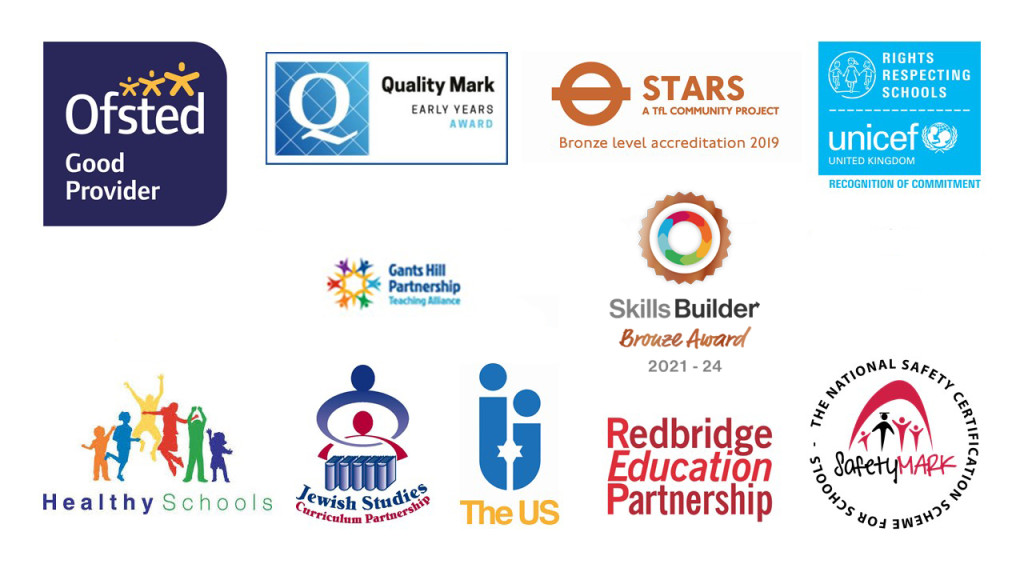Pupil premium strategy statement – Wohl Ilford Jewish Primary School (WIJPS)
This statement details our WIJPS’s use of pupil premium (and recovery premium) funding to help improve the attainment of our disadvantaged pupils.
It outlines our pupil premium strategy, how we intend to spend the funding in this academic year and the outcomes for disadvantaged pupils for the last academic year.
Last update March 2023
School overview
|
Detail |
Data |
| Number of pupils in school | 190 (R-y6) 217 inc nursery |
| Proportion (%) of pupil premium eligible pupils | 13% |
| Academic year/years that our current pupil premium strategy plan covers | 2021/2022 to 2023/2024 |
| Date this statement was published | December 2022 |
| Date on which it will be reviewed | Termly |
| Statement authorised by | Lisa West, Headteacher |
| Pupil premium lead | Lisa West, Headteacher |
| Governor lead | Matt Martin |
Funding overview
| Detail | Amount |
| Pupil premium funding allocation this academic year | £33,625 based on 25 pupils |
| Recovery premium funding allocation this academic year | £17,680 |
| Pupil premium (and recovery premium*) funding carried forward from previous years (enter £0 if not applicable) | £0 |
| Total budget for this academic year
If your school is an academy in a trust that pools this funding, state the amount available to your school this academic year |
£51,305 |
Part A: Pupil premium strategy plan
Statement of intent
| At Wohl Ilford Jewish Primary School we are committed to ensuring that every child makes the best progress possible. No child or group of children should be disadvantaged due to their gender, ethnicity or family circumstances.
The Pupil Premium Grant is a government grant which provides schools with additional money to be used for children who have been, or are, in receipt of free school meals. This is because research has shown that these disadvantaged children do not typically attain as well as their non pupil premium counterparts. We, as a school can utilise that money in whatever way we believe will best improve the chances of success of this disadvantaged group – academic and otherwise. Support may be short term, small group interventions or longer-term enrichment programmes to enable the children to raise their attainment and aspirations. The impact of the spending is tracked and analysed to ensure that the Pupil Premium Grant is spent in a targeted, beneficial way to improve the outcomes and life chances for our most vulnerable children. |
Challenges
This details the key challenges to achievement that we have identified among our disadvantaged pupils.
|
Challenge number |
Detail of challenge |
| 1 |
Assessments, observations, and discussions with pupils indicate oral language and vocabulary gaps among many disadvantaged pupils. These are evident from Reception and progress through to KS2. In general, these are more prevalent among our disadvantaged pupils than their peers. |
| 2 |
Assessments, observations, and discussions with pupils suggest disadvantaged pupils generally have greater difficulties with phonics than their peers. This negatively impacts their development as readers. |
| 3 | Our assessments, observations and discussions with pupils and families indicate that the education and wellbeing of many of our disadvantaged pupils continues to be affected by the impact of the partial school closures during the COVID-19 pandemic, and to a greater extent than for other pupils. These findings are supported by national studies.
This has resulted in significant knowledge gaps leading to pupils falling further behind age-related expectations, especially in writing. |
| 4 | Our assessments (including wellbeing survey), observations and discussions with pupils and families have identified social and emotional issues for many pupils and a lack of enrichment opportunities. These challenges particularly affect disadvantaged pupils, including their attainment. |
Intended outcomes
This explains the outcomes we are aiming for by the end of our current strategy plan, and how we will measure whether they have been achieved.
|
Intended outcome |
Success criteria |
| Improved oral language and vocabulary among disadvantaged pupils. |
Assessments and observations will indicate significantly improved oral language among disadvantaged pupils in reception. This will be triangulated with other sources of evidence, including engagement in lessons, book scrutiny and ongoing formative assessment. |
| Improved reading, writing and maths attainment among disadvantaged pupils. |
KS2 outcomes will show that we are closing the attainment gap for disadvantaged pupils with as many meeting the expected standard as non-disadvantaged. |
| To achieve and sustain improved wellbeing for all pupils in our school, particularly our disadvantaged pupils. | Sustained high levels of wellbeing by summer 2024 demonstrated by:
|
Activity in this academic year
This details how we intend to spend our pupil premium (and recovery premium) funding this academic year to address the challenges listed above.
Teaching and targeted academic support
Budgeted cost: £34,000
|
Activity |
Aim/rationale/evidence that supports this approach |
Challenge number(s) addressed |
| In class support, offering individualised support and challenge to HA and LA pupils |
To accelerate progress in all subjects across all year groups, fostering pupil-led approaches to learning |
1 2 |
| Senior leadership focus on pupil premium pupils to ensure support is targeted | HT assessing data and measuring impact – ensuring targeted support is effective. SENCO providing 1:1 support for individual pupils who most benefit from guidance and nurturing. Both targeted interventions and universal approaches can have positive overall effects:
Behaviour interventions | EEF (educationendowmentfoundation.org.uk) |
1 2 3 4 |
| Use of specific interventions to improve outcomes for the most disadvantaged pupils | Interventions such as Toe-by-Toe (for weaker readers), comprehension and phonics schemes. There is a strong evidence base that suggests oral language interventions, including dialogic activities such as high-quality classroom discussion, are inexpensive to implement with high impacts on reading:
Oral language interventions | Toolkit Strand | |
1 2
|
| Targeting of pupils who are at risk of not achieving their potential | Additional intensive support before and after school day starts to improve outcomes for those at risk of not achieving age-expected outcomes in end of key stage results. There is extensive evidence associating childhood social and emotional skills with improved outcomes at school and in later life (e.g., improved academic performance, attitudes, behaviour and relationships with peers):
EEF_Social_and_Emotional_Learning.pdf |
1 2 3 |
| Teaching by specialists to close the gap in achievement between DPP and non DPP pupils |
Phonics approaches have a strong evidence base that indicates a positive impact on the accuracy of word reading (though not necessarily comprehension), particularly for disadvantaged pupils: Phonics | Toolkit Strand | Education Specialist Maths and English support provided by HLTAs |
1 2 3 |
Wider strategies (for example, related to attendance, behaviour, wellbeing)
Budgeted cost: £18,533.50
|
Activity |
Aim/rationale/evidence that supports this approach |
Challenge number(s) addressed |
| Money available to support children in their choice of after-school sports clubs |
Providing a range of opportunities and equality of access for all children promotes a healthy and active lifestyle |
3 4 |
| Supporting pupils lacking in confidence and self-esteem by providing alternative learning experiences, outside the classroom |
Pupils benefit by becoming more confident and better equipped to deal with potentially challenging situations at home |
3 4
|
| 50% subsidy on school and residential trips to ensure access for all pupils |
Attendance at y6 residential, weekend Shabbatons for year 1 & 2 and 3 & 4, offer a broad range of practical and holistic opportunities for pupils to experience |
4 |
| Understanding the deprivation factors that disadvantaged pupil’s face and supporting their mental wellbeing |
Teachers are more mindful of the way pupils are disadvantaged and take steps to offer pastoral support |
1 2 3 4 |
| Wrap-around care for pupils and their families to support emotional and pastoral needs |
HT and SENCO time plus outside agencies (SEATTs, EWHMs etc) helping to support emotional resilience |
3 4
|
| Supporting vulnerable pupils to deal with any issues which might be affecting them – at home or in school |
Two full days of 1:1 counselling during the school day for pupils needing emotional support. Individuals work towards strategies to cope with issues which might be worrying or affecting them. Half-termly meetings with SLT regarding in-school support of these pupils. Priority given to DPP pupils |
3 4
|
| Nearly new uniform scheme plus promotion of new pre-loved uniform shop |
Promoting a sense of well-being and belonging to all pupils in the school community |
4 |
| Education Welfare Officer supporting families and pupils in improving attendance |
Fortnightly meetings with attendance officer and HT to monitor and pre-empt support for disadvantages families whose attendance and/or parenting is a cause for concern |
4 |
| Free school milk |
Promoting healthy eating |
4 |
Total budgeted cost: £52,533.50
Part B: Review of the previous academic year
Outcomes for disadvantaged pupils
| We have analysed the performance of WIJPS’s disadvantaged pupils during the 2021/22 academic year using key stage 1 and 2 performance data, phonics check results and our own internal assessments.
Schools are not required to publish their 2022 key stage 2 results as DfE is not publishing this data. This is because statutory assessments returned for the first time since 2019, without adaptations, after disruption caused by the pandemic. This is a transitional arrangement for one year only, and DfE plans to publish key stage 2 school performance data for 2023. DfE has shared our school’s 2022 performance data with us, to help us better understand the impact of the pandemic on our pupils and how this varies between different groups of pupils. COVID-19 had a significant impact on the education system and this disruption affected schools and pupils differently, and because of this, it is more difficult to interpret why the results are as they are using the data alone. To help us gauge the performance of our disadvantaged pupils we compared our results to those for disadvantaged and non-disadvantaged pupils at a national and regional level (although these comparisons are to be considered with caution given the caveats stated above). We also looked at these comparisons using pre-pandemic scores for 2019, in order to assess how the performance of our disadvantaged pupils has changed during this period. Data from tests and assessments suggest that the progress and attainment of the school’s disadvantaged pupils in 2021/22 met or exceeded our expectations.
Absence and persistent absence among disadvantaged pupils were higher than their peers in 2021/22. Our observations and assessments demonstrated that pupil behaviour improved last year, but challenges in relation to wellbeing and mental health remain significantly higher than before the pandemic. The impact on disadvantaged pupils has been particularly acute. The unknown factors around the impact of Covid bring into question whether we will continue to meet and achieve the outcomes that we set in the Intended Outcomes section above. We have reviewed our strategy plan and made changes to how we intend to use some of our budget this academic year, as set out in the Activity in This Academic Year section above. The Further Information section below provides more details about our planning, implementation, and evaluation processes. |
Further information
| Additional activity
Our pupil premium strategy will be supplemented by additional activity that is not being funded by pupil premium or recovery premium. That will include:
|
Externally provided programmes
|
Programme |
Provider |
|
n/a |
|




